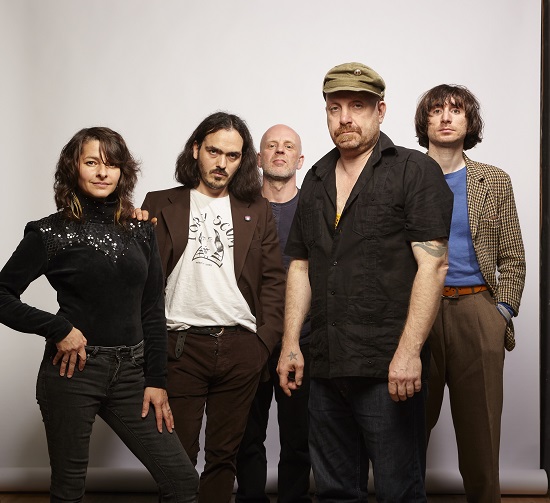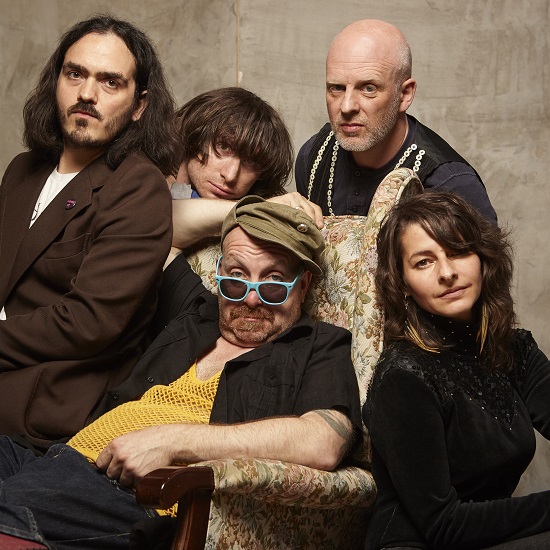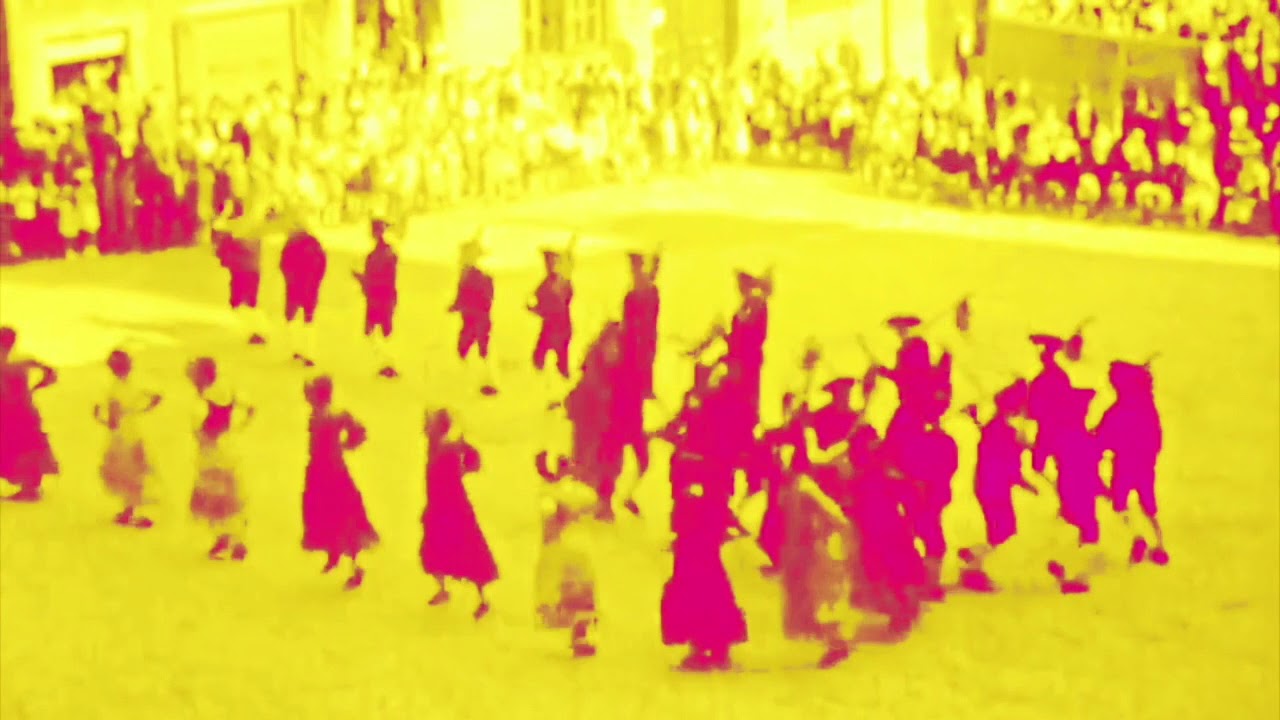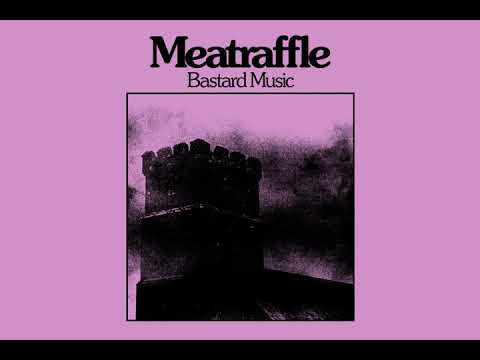Meatraffle portraits courtesy of Felipe Pagani
tQ meets Meatraffle, at their suggestion, in the Three Johns pub in Clerkenwell. These days it’s a gentrified boozer for businessy types, but it keeps a sliver of its heritage. To the right of the table where we’re sat, with frontman Zsa Zsa Sapien and guitarist Tingle Lungfish (not their real names, of course), a modest plaque marks the table where, 113 years ago, Vladimir Lenin decided his Bolsheviks split from the Mensheviks. The band are Marxist-Leninists, but “not the tubthumping, on your soap-box stuff,” Sapien insists. “It’s a little bit more subtle than that…”
Their politics runs through the core of new album Bastard Music, more so than it did on their weird and infectious 2015 debut Hi Fi Classics. On sinister, marching opener ‘The Cyclops’, the band paint a grim, expressionist picture of the nationalist-capitalist enemy at hand, before a defiant chant of ‘¡No pasarán!’. On ‘Meatraffle On The Moon’, they envisage a future lunar society, still under the thumb of capitalist oppression. On ‘The Day The Earth Stood Still’, they pose a scenario in which every worker on Earth goes on strike, and the cataclysmic effects thereof. The years between the two records have seen their views reaffirmed, they say. “Watching everything that’s happened with Brexit, and what’s happening in America, the tide of the far right in Europe… it’s emboldened our politics I think.”
That said, it’s not an album of protest songs. Their statements are often strongly entwined with rich, imaginative stories. ‘N’drangheta Allotment’ is about an exiled mobster running a mafia cell from his allotment in Norbury, South London, for example. They take inspiration and aesthetics from the charm and romance of the black and white sci fi films of their youth, and from Technicolor Hammer Horror flicks. They conjure a rich, imaginative, and often simply funny world; though this album is darker than their debut, there’s no lack of humour. ‘No Books’ is that old John Waters adage in song – “If you go home with somebody, and they don’t have books, don’t fuck ’em!” – , while ‘The Bird Song’, on which bassist Cloudy Truffles takes vocals, is a rebuke to the kind of man that still calls a woman his ‘bird’ – “I live in a house, not in a nest!”
“I’m always saying to myself ‘it’s a funny old world’, it’s a mental yoga thing to me,” Sapien says. “I like that old fashioned way of getting through things by saying something so glib and nonsensical, but it’s also a spiritual thing. You see all the shit that’s going on and say ‘it’s a funny old world’, but nobody’s laughing. It gets you through the day…”
Not only does Bastard Music demonstrate a more polished blend of the band’s influences, it marks a sizeable step up in their musicianship. Where Hi Fi Classics’ strengths lay in spontaneity and charm, its follow up packs tornadoes of noise, where layers of spikey synth whirl around and intersect with drifting, psychedelic trumpet. There’s moments of rousing power and moments of real tenderness, as on the sweeping ‘Green Patina’, and there’s moments of surrealism and joy. “You could never capture the naivete of the first record, so this one was crafted more. We actually had an idea of how we wanted it to sound,” says Lungfish. “The first one just exploded and happened; it was more of a snapshot of a time. It’s not like we’re striving, but you can’t help but get better.”
“None of us started out as musicians,” adds Sapien. “We started very late. We’re learning on the job, really.”
Lungfish and Sapien first met at school in Battersea, and spent their youth attending gigs and acid house raves, but it would be decades before they actually formed a band of their own (aside from a fruitless rehearsal as metal outfit ‘Bodies Everywhere’, in their friend Darren’s shed when they were 18). Initially, Meatraffle was created to perform at a Beatles covers night at the White Lion in Streatham They played ‘Revolution Number 9’, their rendition consisting of playing a Status Quo record backwards and telling a few jokes. Two weeks later the band were playing on the same pub bill as The Fat White Family, then in their initial emergence as the pick of that famous South London scene. “To be a central part of the explosion of culture in that small area, where everyone knows each other, accidentally, it was amazing, but it wasn’t like we’d spent years trying to be in a successful band. It just sort of happened,” Lungfish says.
“We were in the right place at the right time,” Sapien adds. “Who’d have thought that at our age we’d play Green Man festival. It’s crazy. It’s a bit of a trip really.”
Though they started as something of a joke, before long the band were forced to start taking themselves seriously. “For me it was a scary thing to do, getting on stage and playing, trying to remember the chords,” says Lungfish. “That wasn’t a joke, we started taking it seriously quite quickly, and then started realising we really liked it. At first, we thought people were being entertained by the shitness of it, but quickly it moved on to something else, we were doing something original. Then Trashmouth wanted us to record with them, so then it was serious, and then we went on tour with the Fat Whites, so then it was definitely serious.”
The Meatraffle of Bastard Music are by all means a serious proposition, though they have at times struggled to be taken as such. “It’s not a clownish thing, we’re not buffoons,” says Lungfish. "Although maybe our sorts of messages are normally put across in a different sort of voice. people of our accent, we can talk intelligently but still be told we sound stupid. Someone with an Eton accent can say the most stupid things…
“And still be Prime Minister,” Sapien adds. “The things we associate with being ‘intelligent’ are having a certain accent, and coming from a certain background. It’s almost like a pass to get you through life.
“I wouldn’t say we’re intellectual, I prefer class conscious when it comes to the politics. Intelligent can mean a lot of things. It can be the way you can kick a ball. I just say what I feel, I’ve always been disgruntled with the world, I’ve always had my hang-ups, I’m not a great reader but from what I’ve read I find a correlation with what I’ve read and how I’ve always felt since I was a kid. I like being the odd one out, that attitude has helped me understand.”

Touring with the Fat White Family put a few things in perspective, Lungfish continues. “It’s a surreal experience, you have to find out who’s gonna let you in to the venue, you don’t know where to get food, you’re nervous because you’ve got to play in a few hours, then you just end up in this horrible stinky green room. Lias is lying on the floor asleep, or pretending to be asleep, Saul’s smoking where he shouldn’t be and winding up the security staff… It’s hard work physically, drinking too much, going from one place to another then doing it all again, and then the green room is the most boring place on earth, but then you push through the mundane bit to the extreme high of going on stage.”
“You realise just how much there’s no money put into the arts in this country. I was reading the other day that the arts are bringing more revenue to this country than agriculture, but artists are treated like absolute shit. The riders are crap, some fucking square cheese. You go to Europe and it’s fucking lobster thermidor. Proper dinner! In England it was a bonus to get three flavours of Monster Munch!
“If I’m ever abroad I’d never say I’m from England,” Sapien continues. “I’d always say London, because I find it quite embarrassing [being English]. We are involved in a lot of shite around the world, and there’s always two culprits, America and Britain. And you wonder why there’s all this blowback with terrorism and stuff. We don’t even tidy up after our wars. We leave our shrapnel everywhere. And also, what we’re seeing now is a lack of any sense of class history, any sense of looking at the history of the working class. We’re encouraged to go back to so called traditional values of history, to Kings and Queens. How can you possibly jump just a few generations from the miner’s strike and lose any sense of that history and how the state miblisied to crush a working class fightback against captialsim. That’s where a lot of this right wing, new history comes from, and it’s very damaging to working people I think.
“I find this idea of patriotism very toxic, dangerous in a way, it’s what gets everybody to go to war, it’s a trick. I also find Rememberance Day quite disrespectful. What they never think about is suffering. These people do not understand suffering, they have no imagination, they don’t know what it’s like to be in a war. I struggle with this idea of British values, what does that actually mean? Soldiers were wiped out at the peak of their lives, in their 20s and their late teens. Those are the most exciting times of anyone’s life. That was the prime age to sacrifice your life, and that’s somehow respected? I think that’s fucking outrageous.”
There is a grimness to Bastard Music that reflects Sapien’s anger, but there is a defiance to it too, and perhaps even a smattering of hope. For all the horror of The Cyclops, for example, there’s a sense by the end of the song that knowing the enemy is the first stop to defeating it. “I don’t like the word ‘hope’,” he says. “It’s admitting defeat to just be hoping for something to happen.” On ‘Green Patina’, however, they find a deeper kind of solace in the permanence of chemical reactions, that none of this will really matter in the end.
“I said there’s a tragedy of being hopeful, but here is a hope in looking to the natural world and the way things change,” says Sapien. “The emphasis is on the word change.”
“Whatever you do, copper turns to green. Your life, your worries, the system we live under, it’s finite. It’s not the real thing,” adds Lungfish.
“This idea of entropy, it’s my kind of heaven,” his bandmate adds. “Everything will be obliterated. Black holes, planets, everything will be gone. I find that as the ultimate romance, it’s like ‘fuck you, we’re all eventually gonna go down together’. It’s the absolute opposite of bleak
“When I see these far-right marches and the people following them, The EDL, the BNP and their successors, the constant fetishizing of poppies and British flags. They want this remembrance thing to carry on for eternity, but it’s going to crumble into dust. Their ideas will crumble into dust as well.”




